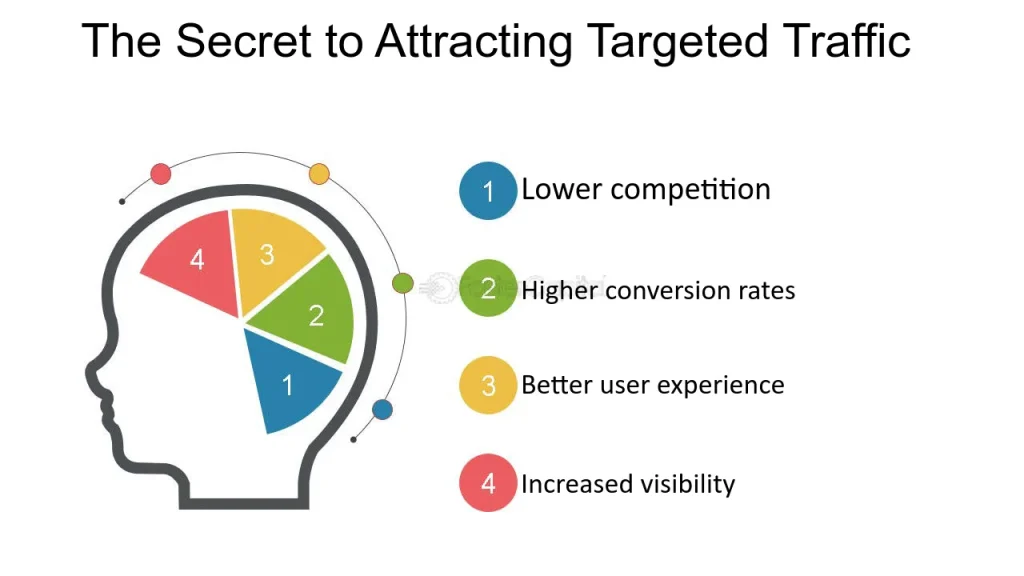From Broad to Specific: How to Refine Your Keyword Research for Targeted Traffic
Understanding Keyword Research
Doing keyword research is crucial to an effective SEO strategy. It includes identifying the specific words and expressions that individuals utilize when looking for products, services or information within your particular field. While it’s tempting to target popular and broad keywords, honing in on specific, targeted keywords can result in higher traffic quality. For example, while a keyword like “shoes” might attract a lot of search volume, it won’t necessarily bring the most qualified traffic to a specialized shoe store that focuses on athletic footwear.

Refining your keyword strategy entails more than just essential keyword identification. To ensure effectiveness, it’s crucial to go beyond surface-level research. Tools and techniques for narrowing down your keyword list help create a more focused and effective strategy. For a more comprehensive understanding of how SEO services can help streamline your strategy, consider exploring resources that delve deep into specialized methods and practices.
Why Refinement Matters
Using general keywords can generate a large amount of visitors, but they might not effectively capture your desired audience. This is where refining your keyword research comes into play. By narrowing down, you attract visitors who are more likely to convert, thereby decreasing bounce rates and increasing engagement metrics. Targeted keywords have the potential to bring in more qualified leads and deliver a better return on investment (ROI). Refinement helps in creating content that resonates more with what users are specifically searching for thus increasing the likelihood of conversions.
Additionally, refined keywords can reduce your advertising costs. When your keywords are more targeted, your content is more likely to be aligned with what search engine users are looking for, which can lower the cost-per-click (CPC) in paid search advertising, thereby achieving more efficient budget use.
Tools to Narrow Down Keywords
Several tools can assist you in refining your keywords effectively:
- Google Keyword Planner: This tool is indispensable for understanding search volumes and competition levels. You can narrow down to the more specific terms recommended to boost your site’s ranking.
- Ahrefs: Known for its comprehensive data, Ahrefs is perfect for competitive analysis and keyword suggestions. It can help you understand which keywords your competitors are ranking for so you can find gaps and opportunities.
- SEMrush: SEMrush is excellent for providing keyword difficulty, search trends and related keywords. It offers a large selection of instruments that can help with the refining process.
Using these tools will help you transition from broad keywords to more specific phrases that are easier to rank for. Each tool offers unique data sets and perspectives that contribute to a well-rounded keyword strategy, making your efforts both efficient and effective.
Analyzing Search Intent
Keyword refinement depends on knowing the purpose of a user’s search. Are they looking to buy something, find information, or navigate to a specific site? Google prioritizes content that matches the user’s intent, making it essential to align your keywords and content with what the user is actually seeking. Moz provides a comprehensive guide on interpreting search intent to improve your SEO strategies.
By categorizing search intent into informational, transactional and navigational, you can better tailor your content. For example, a person looking for the “best running shoes for flat feet” is probably about to make a purchase and is acting with transactional purpose. On the other hand, a search for “how to choose running shoes” is informational and calls for educational content. Understanding these nuances helps craft content that not only ranks well but also meets user expectations, thereby enhancing user experience and engagement.
Long-Tail Keywords
Long-tail keywords are typically longer phrases with three or more words, and they are more specific. While they may not have as high search volumes, they tend to generate more conversions due to their focus on a niche audience. Instead of utilizing the generic term “shoes,” you can target consumers with specific needs by employing a long-tail keyword like “best running shoes for flat feet.” Long-tail keywords can be especially advantageous for small to medium-sized companies aiming to rival more prominent brands because they face less competition and are easier to rank for.
Moreover, long-tail keywords often reflect a higher level of user intent, meaning users searching for these terms are usually further along in the buying process. Hence, they’re more likely to convert compared to visitors who land on your site through broad, generic keywords. This level of specificity not only aids in achieving better rankings but also guarantees that the traffic you attract is more likely to interact and convert.
Tracking Your Progress
It’s essential to monitor how your refined keywords are performing to ensure the effectiveness of your SEO efforts. Utilize tools such as Google Analytics and Google Search Console to monitor the traffic and engagement data for your chosen keywords. This information assists in identifying the keywords that are bringing in traffic, the most engaging pages and areas that may require further refinement.
Continuously optimize your keyword targeting strategy based on the data collected. Tracking metrics like bounce rate, time on site, conversion rates and click-through rates offers insight into the effectiveness of keywords. Consistent tracking ensures that your keyword strategy remains dynamic and adaptable, providing sustained success.
Concluding Thoughts
Improving your keyword research from general to precise is not only recommended; it is essential for drawing in focused traffic that results in conversions. By understanding the importance of keyword refinement, utilizing the right tools, analyzing search intent, and focusing on long-tail keywords, you’re setting yourself up for SEO success. Keep tracking your progress to improve your strategy continually.
Read Also: Maximize Your Sales with a Poshmark Bot: The Ultimate Automation Guide for Resellers



